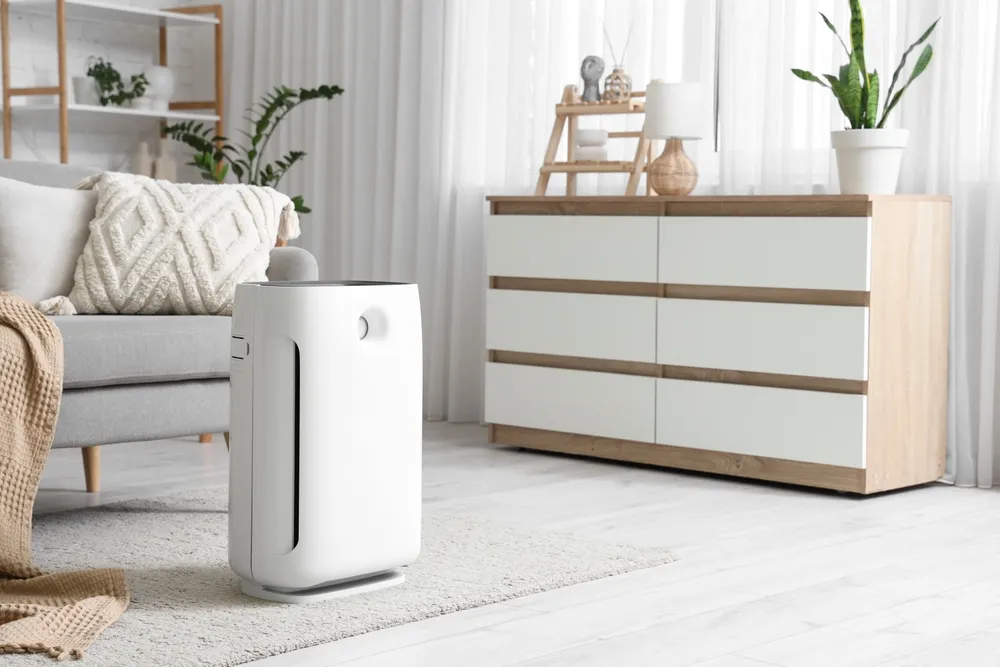[et_pb_section fb_built=”1″ _builder_version=”4.6.5″ _module_preset=”default” custom_padding=”0px||0px||true|false” hover_enabled=”0″ sticky_enabled=”0″][et_pb_row _builder_version=”4.6.5″ _module_preset=”default”][et_pb_column _builder_version=”4.6.5″ _module_preset=”default” type=”4_4″][et_pb_text _builder_version=”4.6.5″ _module_preset=”default” hover_enabled=”0″ sticky_enabled=”0″]
What happens when we breathe? Air travels into your trachea, through the airways, and into the lungs.
The air is then pulled into tiny sacs called alveoli. They take the oxygen and pass it into your bloodstream. At the same time, carbon dioxide travels out of the lungs.
The air, however, isn’t always as clean as it seems. There can be pollutants such as mold, pet dander, chemicals, and more.
That’s why it’s so important to use an air purifier—it literally allows you to clean the air.
Not convinced? Want to know more about air purifier benefits? If so, you’ve stumbled on the right page.
Keep reading to learn more!
How Do Air Purifiers Work?
Air purifiers are devices that remove contaminants from the air. In doing so, they improve indoor air quality. In one study, they reduced particulate matter (pollutant particles suspended in air) by an average of 69 to 80 percent.
How do they work? They move air through a filter, during which particles are captured. The clean air is then pushed back out into the room.
9 Things That an Air Purifier Can Do
Using an air purifier can improve your health. Here are a few reasons why you might want to use one:
1. They Remove Allergens
Air purifiers are capable of removing allergens such as pollen, pet dander, and dust mites from the air. This is important when you consider the fact that allergies are the most common chronic disease in Europe.
Aside from HEPA filters, some devices may also have an ioniser, which allows for pollutants to settle out of the air.
2. They Eliminate Cigarette Smoke
Exposure to cigarette smoke is one of the major causes of lung disease. It can cause asthma, bronchitis, even cancer.
A HEPA-rated air purifier will help to eliminate these particles from your home. Ideally, you want to get one with a three-stage filtration system as they tend to work better.
3. They Reduce Odors
Air purifiers are excellent at removing odors caused by things such as cooking, pets, and chemicals. The secret is getting one with an activated carbon filter—that’s the thing that absorbs the smell.
Basically, it’s a thin packet that goes into the device. It traps the offending particles in a bed of charcoal and in doing so, purifies the air.
4. They Remove Bacteria
It’s not uncommon for the air to be contaminated with bacteria and other microorganisms. Breathed into the body, they can easily cause disease.
That’s where air purifiers come in—they’re capable of removing the smallest of microbes, including these germs. More specifically, studies have shown that they can remove up to 99% of airborne bacteria.
They do this in two ways—they either trap the microbes in a filter or kill them using UV light.
5. They Eliminate Radon Gas
Breathing in certain gases can increase your risk of lung cancer. Radon is one of them. To give you a better idea, it’s linked to 1,100 lung cancer deaths per year.
Formed by the disintegration of radium, it can leak into homes through cracks in the walls or gaps around pipes. Fortunately, you can reduce its levels by using an air purifier.
The filter traps the particles, which prevents them from staying in your living space.
6. They Lower Levels of Carbon Dioxide
Carbon dioxide is present in the air. This isn’t too surprising—after all, we constantly breathe out.
Too much in one area, however, can be a problem. It can lead to dizziness, headache, sweating, and increased heart rate.
One way to reduce their levels is by using an air purifier. Opening the windows can also help—it allows for fresh oxygenated air to enter the home.
7. They Can Improve Sleep Quality
The quality of the air around you can affect how well you sleep. For instance, researchers have found that those who live in areas with high levels of air pollution are 60% more likely to sleep poorly.
Given that, it’s not surprising to know that using an air purifier can improve your sleep. Not only does it cleanse the air, but it also generates a calming noise, which can have a relaxing effect.
8. They Can Boost Your Mood
Air pollution can have an impact on your mood. Put it this way, you’re much more likely to be happy if you’re breathing in clean air.
Certain air purifiers are also capable of releasing negative ions into the air, which has a similar effect. More specifically, they increase serotonin levels, the “feel-good” chemical in the body.
This makes you happier and less likely to experience depression.
9. They Can Reduce Stress
Breathing polluted air makes you more susceptible to stress. What happens when you purify the air? You’ll reduce levels of cortisol, the primary stress hormone in the body. In doing so, you’ll be able to relax.
Not only that but knowing that your home is free from hazardous air particles (e.g. bacteria, viruses, allergens, etc) can also give you peace of mind. This is especially true if you’re prone to allergies.
Understanding Air Purifier Benefits
And there we have it—nine air purifier benefits. As you can see, these devices can improve your health in several ways. Not only will they make the air cleaner, but they’ll also make you feel better as well!
Given that, why wouldn’t you want to use one?
Do you know what else might help? A massager. Why not check out our shop? We have many different kinds available!
[/et_pb_text][/et_pb_column][/et_pb_row][/et_pb_section]




